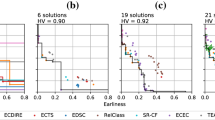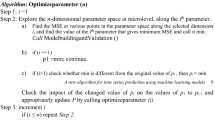Abstract
Global optimization, especially Bayesian optimization, has become the tool of choice in hyperparameter tuning and algorithmic configuration to optimize the generalization capability of machine learning algorithms. The contribution of this paper was to extend this approach to a complex algorithmic pipeline for predictive analytics, based on time-series clustering and artificial neural networks. The software environment R has been used with mlrMBO, a comprehensive and flexible toolbox for sequential model-based optimization. Random forest has been adopted as surrogate model, due to the nature of decision variables (i.e., conditional and discrete hyperparameters) of the case studies considered. Two acquisition functions have been considered: Expected improvement and lower confidence bound, and results are compared. The computational results, on a benchmark and a real-world dataset, show that even in a complex search space, up to 80 dimensions related to integer, categorical, and conditional variables (i.e., hyperparameters), sequential model-based optimization is an effective solution, with lower confidence bound requiring a lower number of function evaluations than expected improvement to find the same optimal solution.



Similar content being viewed by others
References
Bischl B, Richter J, Bossek J, Horn D, Thomas J, Lang M (2017) mlrMBO: a modular framework for model-based optimization of expensive black-box functions. arXiv:1703.03373
Candelieri A (2017) Clustering and support vector regression for water demand forecasting and anomaly detection. Water 9(3):224
Candelieri A, Archetti F (2014) Identifying typical urban water demand patterns for a reliable short-term forecasting—the icewater project approach. Procedia Eng 89:1004–1012
Candelieri A, Soldi D, Archetti F (2015) Short-term forecasting of hourly water consumption by using automatic metering readers data. Procedia Eng 119(1):844–853
Candelieri A, Giordani I, Archetti F (2017) Automatic configuration of kernel-based clustering: an optimization approach. In: International conference on learning and intelligence optimization. Springer, Cham, pp 34–49
Dhillon IS, Guan Y, Kulis B (2004) Kernel k-means: spectral clustering and normalized cuts. In: Proceedings of the tenth ACM SIGKDD international conference on knowledge discovery and data mining, pp 551–556
Feurer M, Klein A, Eggensperger K, Springenberg J, Blum M, Hutter F (2015) Efficient and robust automated machine learning. In: Advances in neural information processing systems, pp 2962–2970
Huang D, Allen TT, Notz WI, Zeng N (2006) Global optimization of stochastic black-box systems via sequential kriging meta-models. J Glob Optim 34(3):441–466
Kandasamy K, Schneider J, Pòczos B (2015) High dimensional Bayesian optimisation and bandits via additive models. In: International conference on machine learning, vol 37, pp 295–304
Mockus J, Tiesis V, Zilinskas A (1978) The application of Bayesian methods for seeking the extremum. In: Dixon L, Szego G (eds) Towards global optimisation 2. Elsevier, New York, pp 117–130
Shahriari B, Swersky K, Wang Z, Adams RP, de Freitas N (2016) Taking the human out of the loop: a review of bayesian optimization. Proc IEEE 104(1):148–175
Snoek J, Larochelle H, Adams RP (2012) Practical Bayesian optimization of machine learning algorithms. arXiv:1206.2944[stat.ML]
Thornton C, Hutter F, Hoos HH, Leyton-Brown K (2013) Auto-WEKA: combined selection and hyperparameter optimization of classification algorithms. In: Proceedings of ACM SIGKDD, pp 847–855
Wang Z, Zoghi M, Hutter F, Matheson D, De Freitas N (2013) Bayesian optimization in high dimensions via random embeddings. In: Proceedings of the international joint conference on artificial intelligence, pp 1778–1784
Wolpert DH (1996) The lack of a priori distinctions between learning algorithms. Neural Comput 8(7):1341–1390
Author information
Authors and Affiliations
Corresponding author
Ethics declarations
Conflict of interest
Antonio Candelieri and Francesco Archetti declare that they have no conflict of interest.
Ethical approval
This article does not contain any studies with human participants or animals performed by any of the authors.
Additional information
Communicated by P. Beraldi, M.Boccia, C. Sterle.
Publisher’s Note
Springer Nature remains neutral with regard to jurisdictional claims in published maps and institutional affiliations.
Rights and permissions
About this article
Cite this article
Candelieri, A., Archetti, F. Global optimization in machine learning: the design of a predictive analytics application. Soft Comput 23, 2969–2977 (2019). https://doi.org/10.1007/s00500-018-3597-8
Published:
Issue Date:
DOI: https://doi.org/10.1007/s00500-018-3597-8




